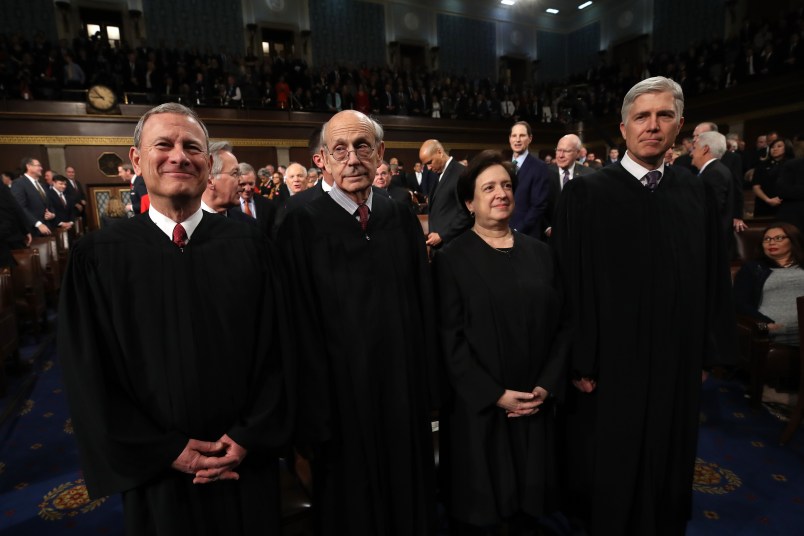The Supreme Court indicated Friday that it would be hearing two partisan gerrymandering cases in March: one from North Carolina and one from Maryland.
The North Carolina case stems from years of redistricting drama in the state. After North Carolina’s U.S. congressional map, drawn by its GOP statehouse, was struck down because it was an illegal racial gerrymander, Republican legislators explicitly said that they would redraw it with the aim of gerrymandering on a partisan basis.
“I think electing Republicans is better than electing Democrats,” said North Carolina state Rep. David Lewis (R) said as legislators were passing the map in 2016. “So I drew this map to help foster what I think is better for the country.”
A three-judge panel in August said that such a partisan gerrymander was unconstitutional. The map gave Republicans 10 out of North Carolina’s 13 congressional seats in 2016, as GOP lawmakers predicted, despite Republicans winning the statewide vote of only 53 percent.
The Maryland case is a challenge to a congressional district drawn by Democratic lawmakers in the state. It was struck down in November by a three-judge panel, which ordered the state to redraw the map in time for the 2020 elections. The Supreme Court has intervened in this case before, and last year declined to rule on the merits while sending it back to the trial court for further review.
For years, voting rights advocates have hoped to get a Supreme Court decision that would draw the line on when partisan gerrymanders were so extreme that they violated the constitution. However, their strategy rested on former Justice Anthony Kennedy, a potential swing vote who had hinted at his discomfort with partisan gerrymandering in the past. Kennedy declined to join the liberals in two big partisan gerrymandering cases last term, but the court was able to decide those on a narrow, technical basis that left open the bigger question of partisan gerrymandering on the merits.
Because Kennedy has since departed the court, and has been replaced by Justice Brett Kavanaugh, a former GOP operative-turned-judge, voting rights advocates are concerned by the prospect of the Supreme Court granting review of the North Carolina case.
There’s an excellent chance that tomorrow the Supreme Court will announce it will take up (again) the question whether partisan gerrymandering is unconstitutional. Don’t take an agreement to hear case as a sign the Court will police gerrymandering. It is actually the opposite. /1
— Rick Hasen (@rickhasen) January 4, 2019
A three-judge district court found that North Carolina’s congressional districts were an unconstitutional partisan gerrymander. These kinds of cases come up to #SCOTUS on “appeal” not a “cert. petition” and a ruling not to hear an appeal means the lower court got it right. /2
— Rick Hasen (@rickhasen) January 4, 2019
So it’s almost impossible to believe that Court won’t hear the North Carolina case. Last term the Court ducked the merits in the Wisconsin partisan gerrymandering case. But it is clear that the conservatives on the Court are skeptical federal courts can police gerrymandering. /3
— Rick Hasen (@rickhasen) January 4, 2019
The wildcard last year was Justice Kennedy, who had vacillated on the question whether courts could hear partisan gerrymandering cases since 2004. The Court’s punt in Wisconsin was because Kennedy wasn’t ready to join the four liberals to start federal courts policing this. /4
— Rick Hasen (@rickhasen) January 4, 2019
And now Kennedy is gone, replaced by Kavanaugh. We don’t know what Justice Kavanaugh thinks specifically about partisan gerrymandering, but his general ideological orientation makes me very skeptical he’d vote to have courts enter this “political thicket.” /5
— Rick Hasen (@rickhasen) January 4, 2019
Correction: A previous version of this story mistakenly described Rep. David Lewis as a lawmaker from Georgia. He is from North Carolina.






